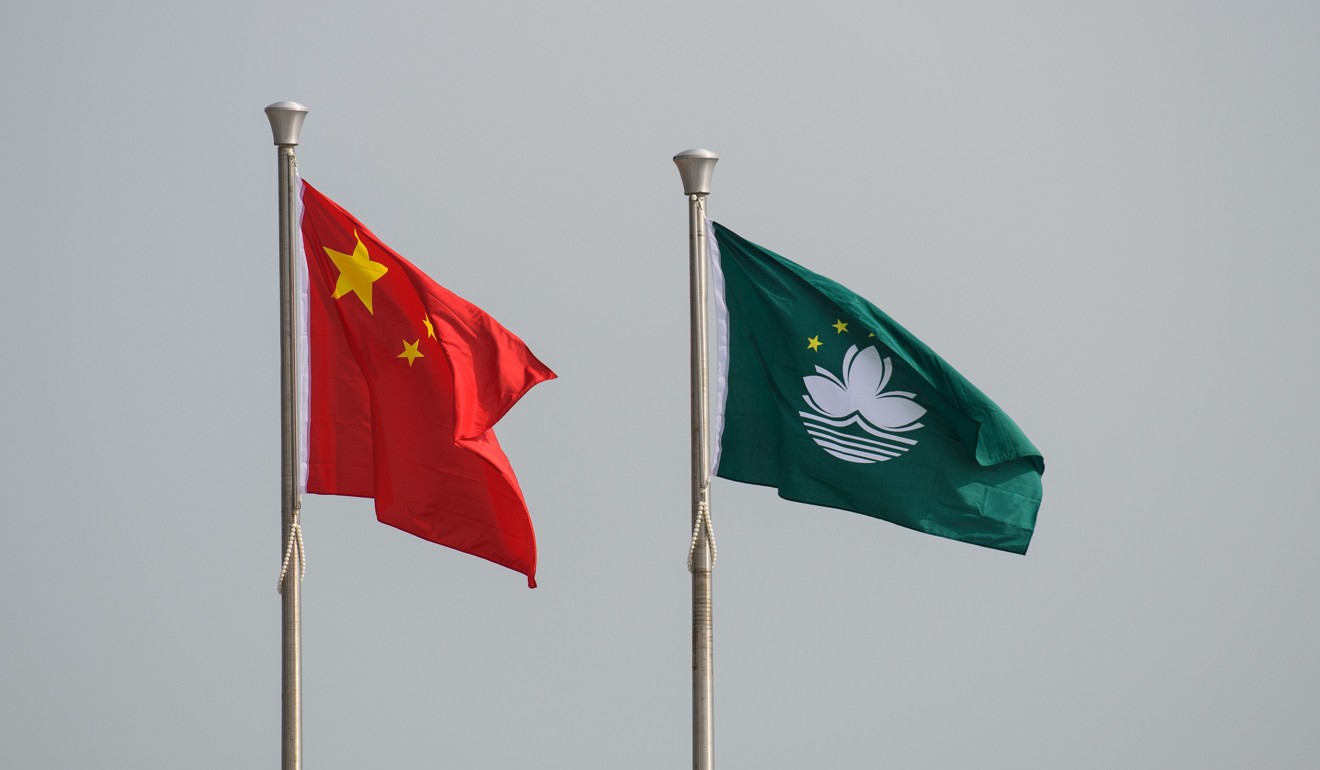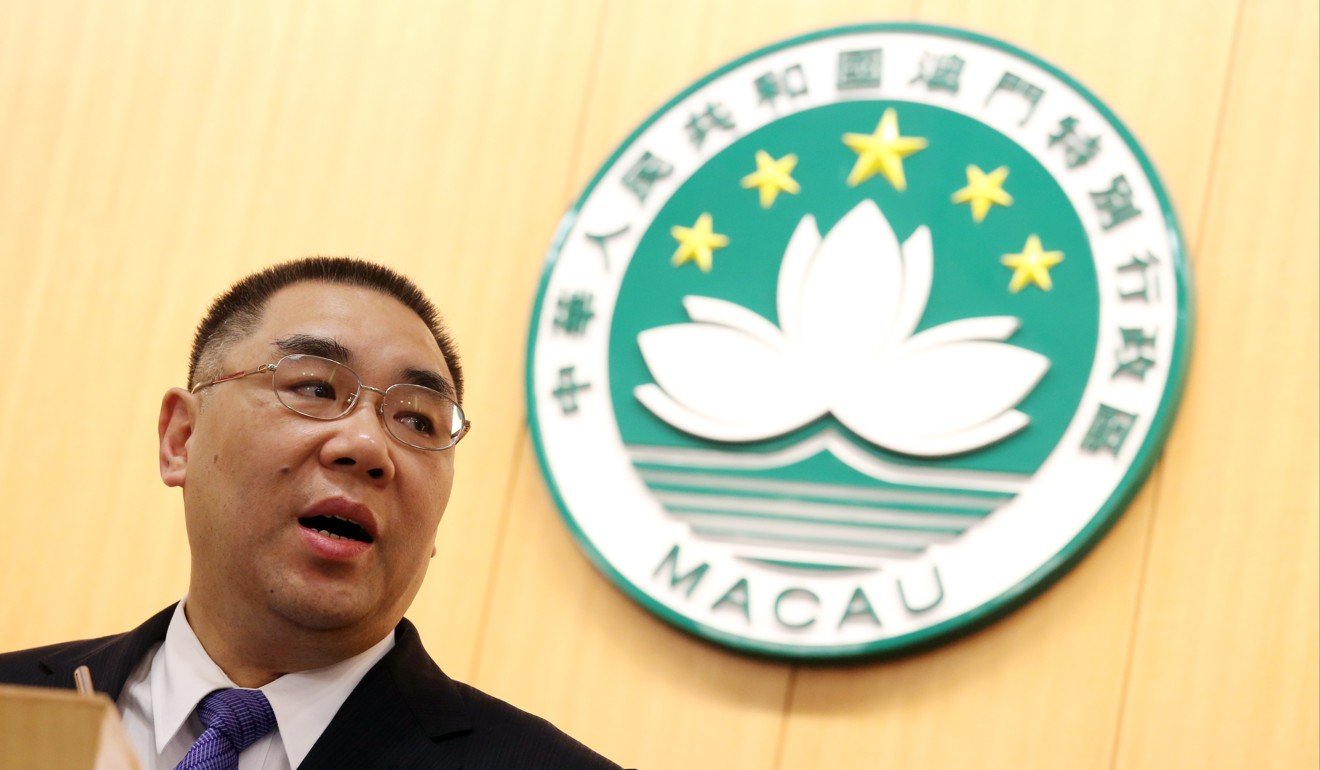
President of Macau’s Legislative Assembly Ho Iat-seng tipped to be city’s next chief executive and will probably run unopposed
- Ho Iat-seng, a respected business leader, was expected to become chief executive in 2009 but decided to run for the legislature instead
- The new leader will be inaugurated in December, on the 20th anniversary of the former Portuguese enclave’s handover to China
When Macau celebrates the 20th anniversary of its handover from Portuguese to Chinese rule on December 20, its new leader will also be sworn in.
However, unlike a decade ago, when Fernando Chui Sai-on was elected chief executive after serving for 10 years as the city’s minister for social affairs and culture, this time a politician with no government experience could take over the casino hub.
The president of Macau’s legislature, Ho Iat-seng, was expected to be the sole candidate in the city’s leadership election in August, after he announced his intention to run last week.
His resignation from China’s top legislative body, the National People’s Congress Standing Committee (NPCSC), was unanimously approved by the body’s members on Tuesday. He has yet to resign from Macau’s legislature.
Macau poised to become richest place on the planet by 2020
Ho comes from a prominent industrial and political family in the special administrative region. His late father, Ho Tin, who hailed from Zhejiang province, was one of Macau’s best-known industrialists and supplied goods to mainland China in the 1960s and 70s.
A respected business leader in Macau, Ho Iat-seng entered politics in 2000 as a local deputy to China’s legislature, the National People’s Congress. From 2004 to 2009 he was an adviser to Macau chief executive Edmund Ho Hau-wah in the Executive Council.

Before his appointment to Exco, Ho Iat-seng was already tipped to become chief executive in 2009, but he surprised many by announcing he had no intention of running, and the job eventually went to Chui, the only contender in the race.
Ho opted for the city legislature election instead, and was returned uncontested in the business and finance sector.
It wouldn’t be a big problem if the next chief executive were to have never been an official, because a chief executive’s job is to make decisions while officials execute policies
Macau legislator Au Kam-san, who worked with Ho in the Legislative Assembly for a decade, believed a wealth of political experience could help Ho tackle Macau’s economic and social challenges.
“As a legislator for China and Macau, Ho can see our Legislative Assembly has not been powerful enough monitoring the city’s government, and could give him a stronger impetus and motivation for reform,” Au said.
“It wouldn’t be a big problem if the next chief executive were to have never been an official, because a chief executive’s job is to make decisions while officials execute policies.”
Ieong Tou-hong, vice-president of the Macau Economic Association, a group of academics studying the city’s public policies, echoed Au’s comments.
“As a member of the NPCSC and the city legislature for many years, Ho would have a deep understanding of national and local laws. This is a fundamental requirement for chief executive,” he said.
Ieong added that for Macau to succeed under Beijing’s “Greater Bay Area” plan, the city also need a leader who is familiar with national and regional cooperation, not just public administration.
He was referring to the central government’s plan to turn Hong Kong, Macau and nine Guangdong cities into a financial and technology hub to rival Silicon Valley by 2035.
High voter turnout in Macau shakes up political status quo as youngest ever lawmaker elected
Under the project’s blueprint, Macau would develop into a tourism and leisure centre and a platform for trade with Portuguese-speaking countries, such as Brazil.
“His business background, national vision and working relationship with mainland authorities will help Macau to grasp new opportunities,” Ieong added.

But Au said that rather than focusing on the national project, the people of Macau were more concerned with social problems such as employment and housing.
“External labour accounts for about half of our working population. And while drivers and people in the gambling industry might earn a lot, working conditions for other sectors have been deteriorating,” he said.
“Officials should do an in-depth analysis of how to import labour without hampering local people’s employment opportunities.”
Au also complained the government had not been building enough subsidised housing, especially when pushing forward land reclamation and urban renewal projects. The new chief executive had to do more on these areas, he said.
Head of Chinese government’s liaison office in Macau dies in fall from home
Under Macau’s electoral law, the chief executive is elected by a 400-member election committee.
A poll will be organised to pick the 400 members of the committee in June. It will be followed by a nomination period in July, during which a candidate must garner at least 66 nominations from the committee’s members.
Ho was the first to announce a candidacy. In 1999, Edmund Ho defeated banker Stanley Au Chong-kit to become the city’s first postcolonial leader. But in each of the three elections that followed, in 2004, 2009 and 2014, there was just one candidate.
Lionel Leong Vai-tac, Macau’s secretary of economy and finance, was previously tipped to run, but pundits now believed it was likely Ho would be the only candidate.
In the event of there being only one runner, an election would still be held and the candidate would be elected if he garnered at least 200 votes.

